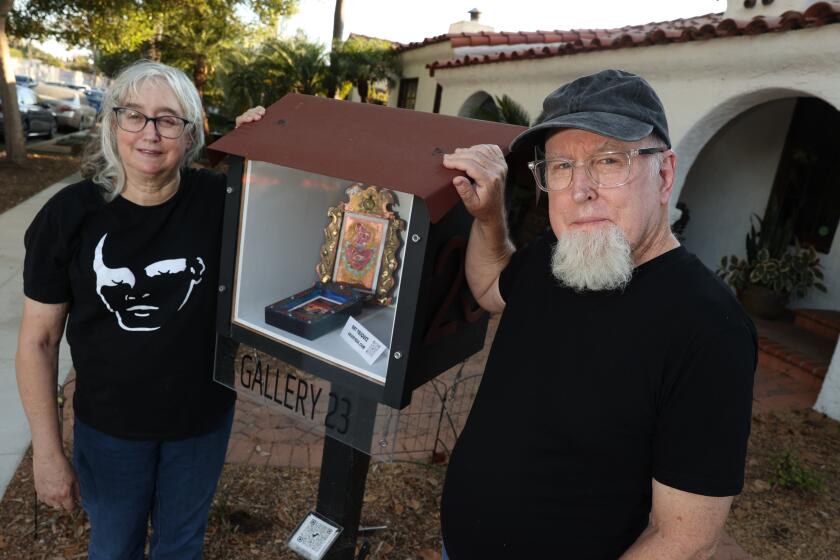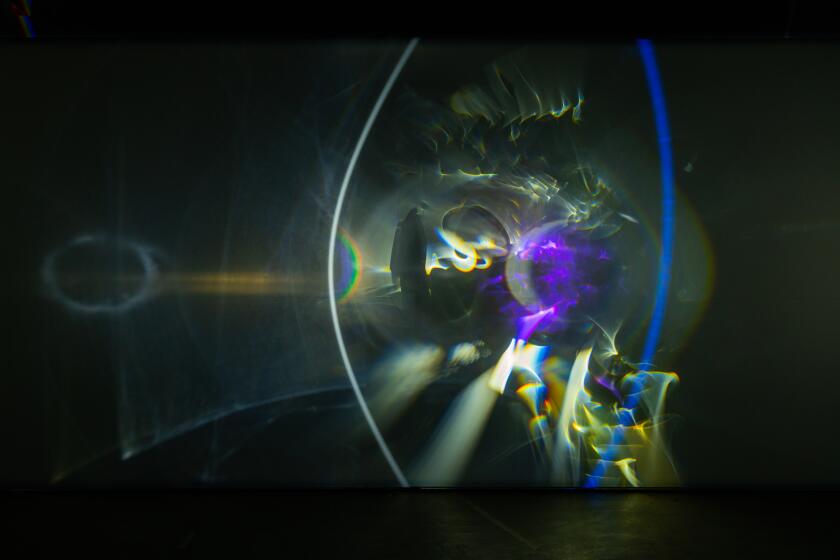The Elder Statesman of Eclectic
A tall, lanky professor, sporting a “Find Yourself in the Arts” T-shirt, is putting a UC Irvine dance class through its paces.
“Turn up--and feather down,” he says, his hands cascading like a waterfall. A few moments later, he breaks into song, accompanying a blues recording in a velvety baritone.
“Fare thee well, oh honey,” he croons, losing himself in the music before addressing the dancers again “Don’t blur--be very clear when you wave goodbye. As the last image this man sees as the train pulls away, it’s firmly fixed in his mind.”
The words carry more weight than the average instructor’s, for Donald McKayle’s five decades in modern dance have made him a leading voice--and a living archive--of the art form. He has created more than 50 pieces--most notably his 1959 classic “Rainbow ‘Round My Shoulder”--for companies in Canada, Europe, South America and the U.S. A five-time Tony nominee, his shows include “Sophisticated Ladies,” “Golden Boy” and “Raisin.” From 1951 to 1969, he led his own troupe--Donald McKayle and Company, whose alumni include legends like Eliot Feld, Alvin Ailey, Lar Lubovitch and Arthur Mitchell.
“Lubovitch was go-go dancing at a Greenwich Village club, when I met him,” the 67-year-old choreographer recalls, over lunch in a Chinese restaurant across from the campus. “Mrs. Feld brought Eliot to me when he was 12. 1 was dancing in [the 1954 Broadway musicale ‘House of Flowers’ when choreographer George Balanchine was replaced by Herbert Ross. And though I was unable to hire Judith Jamison on a project, I gave Alvin [Ailey] her card.”
The preternaturally youthful McKayle, in fact, has been looking back more than usual these days. As the most recent recipient of what UCI calls its Distinguished Faculty Lectureship Award for Research, the highest honor professors can award a colleague, he’s scheduled to deliver a talk next week. Entitled “The Symbolic Language of Dance: Fifty Years of Dance Making,” it will not only offer hard-won insights but encapsulate his professional life.
To illuminate the lecture, artists from a half-dozen companies with whom McKayle is closely associated--among them Limon Dance Company; Denver’s Cleo Parker Robinson Dance Ensemble and Los Angeles’ Lula Washington Dance Theatre--will perform excerpts from his work. In addition, his collected memorabilia will be exhibited at the library at UCI, where he has taught since 1989.
“This award has always honored criticism, analysis, medical and scientific research,” says McKayle, whose easygoing demeanor masks bottomless drive.
“This is the first time it’s been given for a body of creative work.
“There will be a lot of ‘retrospect’ in my lecture, as well plans for the future. As long as your dreams exceed your memories, you stay young.”
McKayle’s work is an eclectic mix--the creation of a man who resists categorization. Though people like to put him into boxes, he “defies corners,” he says.
Modern dance has been his primary focus, but he’s studied tap Indian, flamenco and ballet over the years. He points out that Indian hand movements found their way into his 1997 “Heartbeats” and flamenco into “Los Angelitos Negros,” a section of his famed “Songs of the Disinherited.” Elements of Russian, Croatian and American folk dancing that he studied as a teenager have also crept into his work.
“I’m not a disciple who worships at one altar,” McKayle explains. “I have an ecumenical love for the field. I love differences and change.”
Carmen de Lavallade--who made her name dancing with Lester Horton and Alvin Ailey--calls her friend a “historian.” “Rainbow” is about a chain gang, she notes. “District Storyville” portrayed New Orleans when black women could clean houses or become whores. “Games,” based on McKayle’s childhood, shows an ethnic mix of tenement children playing--until police break it up.
“Donny’s work is rooted in the American--and African-American--experience,” she says. “He responds to the social environment--and always has a point of view.”
Still, when deciding which subjects to tackle, McKayle’s ecumenicism again kicks in. He has created a work about the controversial Mexican artist Frida Kahlo, and his “House of Tears” (1992) targets those killed by Argentina’s military regime.
The look of his dances also reflects his predilection for contrast and texture. “There are a lot of contrapuntal themes--music doing one thing, dance doing another,” McKayle notes. “I’m also concerned with visual rhythms--how the dancers stack up onstage.”
Like Twyla Tharp and Graham, says De Lavallade, McKayle’s steps arise out of who he is. “Donny’s choreography has big long lines and is very fast--just like him,” she says of the 6’2” choreographer. “Onstage, he had the beauty of a big cat.”
McKayle, a native New Yorker, determined his career course at the age of 15, when he saw the early modernist Pearl Primus perform. After the show, a friend of his who was a student of Primus, showed him a few steps.
“From the beginning, I was making up dances--’You do this, I’ll do that,’ he says. “I had a wonderful innocence. I didn’t know you were supposed to learn to dance before you started to choreograph.”
Two years later, in 1947, he hooked up with the New Dance Group where he studied with Primus and Sophie Maslow, a former Martha Graham dancer who became McKayle’s mentor. “The company was “unusually democratic,” he says. “I didn’t have to bang my head against the wall like other African Americans. But, then, modern dance has always been easier than ballet Balanchine once said ‘ballet is a woman with skin the color of peeled apples.’ Not many of my people can relate to that.”
During the next two decades, McKayle was never out of work--a rarity in his profession. In addition to his own company, he had a solo career dancing with the likes of Merce Cunningham and Martha Graham. He did TV and Broadway. His commissions included the 1964 “Daughters of the Garden” for Tel Aviv’s Batsheva Dance Company. While working on the project, he met an Israeli flamenco dancer, Lea Vivante, whom he later married. They have three children and one grandchild.
Tired of hand holding and administration, McKayle dissolved his Troupe in 1969 and headed West to choreograph “The Leslie Uggams Show.” He’s been here ever since, juggling concert dance, movies (“The Great White Hope,” Disney’s “Bedknobs and Broomsticks”), and stage shows (for Diana Ross, the Temptations).
“Hollywood dancers were used to working in short spurts because of the ‘hurry up and wait’ syndrome,” he says. “They’d come to rehearsal with knitting and beach chairs. I held class every morning. The notion was totally alien to them.”
From 1970 to 1973, he also took on another company, Inner City Repertory Dance Company. It folded just after he left as artistic director. “We made it, but we didn’t retain it,” he says. “Having a company is all-consuming and I was pulled in different directions. We did fine on the road, but L.A. didn’t fully embrace us. The arms kept opening--and the baby kept dropping to the ground.”
McKayle has taught at schools ranging from Sarah Lawrence to Juilliard and was on the founding faculty of CalArts. He has a host of reverential students nationwide including Alonzo King, founder of San Francisco’s Lines Contemporary Ballet. “Donny is a soft wind behind a powerful tornado,” King says. “His strength comes from confidence, knowing who he is.”
Judith Jamison, artistic director of the Alvin Ailey Dance Theatre--one of McKayle’s primary showcases--sums him up simply. “Donny had something to say and he still does,” she says, ‘I’m just glad he’s still here.”
McKayle, the tornado, shows no sign of abating. He just completed an autobiography, “I Will Dance With You,” for a London publisher, writing between 6 a.m. and 8 a.m. over two years. “Shimmy,” a musical based on “District Storyville,” will have a reading at the Denver Performing Arts Center in June and, in July, Lincoln Center will feature six nights of his choreography in one of its summer series.
This summer, McKayle will also be rehearsing a project for the Dayton Contemporary Dance Co. and the National Afro-American Museum and Cultural Center in Ohio. Part installation and part live performance, it will be presented in February and tour in 2000. Cal State L.A. has its own McKayle retrospective planned for next season. And, with an eye on the millennium, The choreographer is creating a new piece for the Ailey company, to premiere December, 1999.
The term “elder statesman” crept up slowly, says McKayle.
“Getting all these awards is a reminder I’ve been around, seen a lot,” he says. “But are they trying to bronze me? I’d get dusty, sitting on a shelf.”
*
DONALD McKAYLE Irvine Barclay Theatre, 4242 Campus Drive, Irvine. Date: May 18, 7:30 p.m. Price: Free. Phone: (949) 854-4646.
More to Read
The biggest entertainment stories
Get our big stories about Hollywood, film, television, music, arts, culture and more right in your inbox as soon as they publish.
You may occasionally receive promotional content from the Los Angeles Times.










